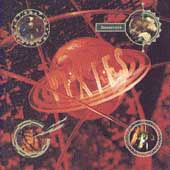
Kyle Falconer's distinct tone shines through on every View song, blending his Scottish accent with a mixture of Bobby Gillespie and Robert Plant. Overall he's got a great rock 'n' roll voice which makes Superstar Tradesman and Wasted Little DJs far more interesting than they would otherwise have been.
The rest of the record throws up a few suprises. I’d never heard Scots do 2-tone until I’d heard the insanely catchy ‘Wasteland’ and ‘Face for the Radio’ is a witty and beautifully melodic number that recalls Hurricane #1’s brilliant but unappreciated ‘Monday Afternoon.’ But, for the most part, Hats Off To The Buskers is just two or three songs too long and one step off the pace set by Arctic Monkeys last year. The similarities between the two bands are uncanny at times but ultimately The View’s debut album is on the second tier, but demonstrates massive scope for improvement if tracks like ‘Face for the Radio’ and ‘Don’t Tell Me’ are anything to go by.






























